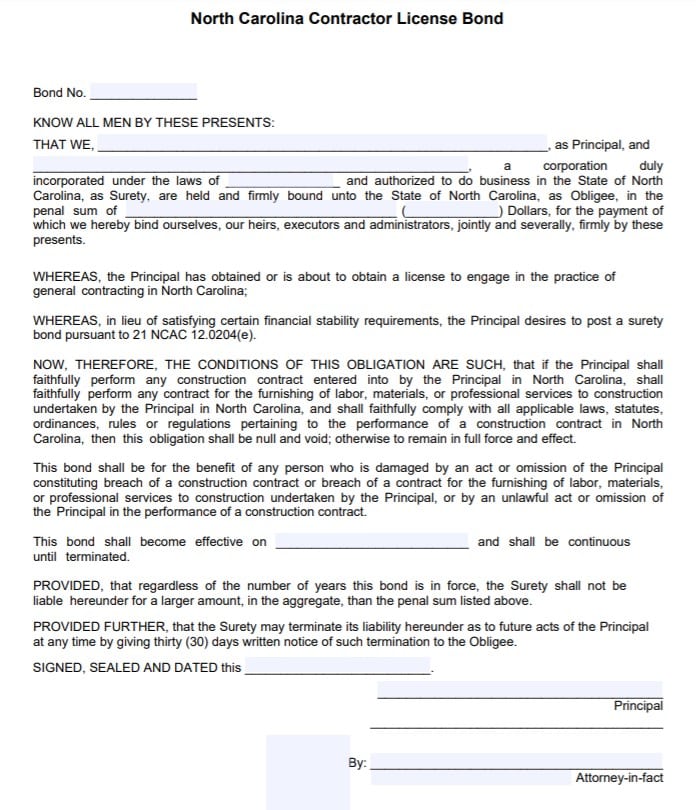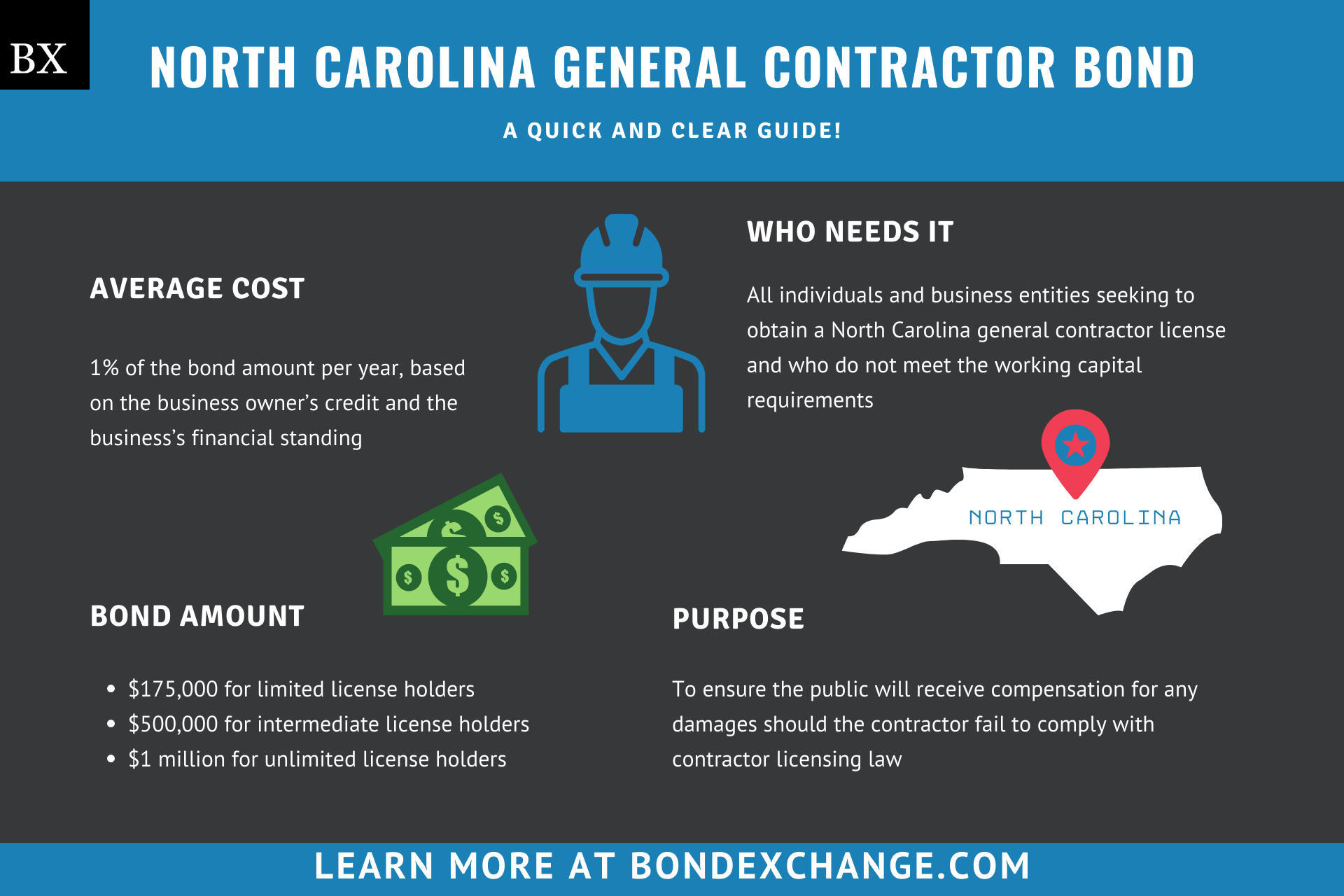North Carolina General Contractor Bond: A Comprehensive Guide
This guide provides information for insurance agents to help contractors on North Carolina General Contractor Bonds
At a Glance:
- Lowest Cost: 1% of the bond amount, based on the business owner’s credit and the business’s financial standing
- Bond Amount:
- $175,000 for limited license holders
- $500,000 for intermediate license holders
- $1 million for unlimited license holders
- Who Needs it: All individuals and business entities seeking to obtain a North Carolina general contractor license and who do not meet the working capital requirements (more on this later)
- Purpose: To ensure the public will receive compensation for any damages should the contractor fail to comply with contractor licensing law
- Who Regulates General Contractors in North Carolina: The North Carolina Licensing Board for General Contractors

Background
North Carolina Statute 87-10 requires general contractors operating in the state, and who work on construction projects costing $30,000 or more, to obtain a license with the NC Licensing Board for General Contractors. The North Carolina legislature enacted the licensing laws and regulations to ensure that contractors engage in ethical business practices. In order to provide financial security for the enforcement of the licensing law, contractors who do not meet the working capital requirements must purchase and maintain a surety bond to be eligible for licensure.
What is the Purpose of the North Carolina General Contractor Bond?
North Carolina requires general contractors to purchase a surety bond as part of the application process to obtain a business license. The bond ensures that the public will receive compensation for financial harm if the general contractor fails to comply with the licensing regulations set forth in North Carolina statutes 87-1 through 21 NCAC 12B .0403. Specifically, the bond protects the public in the event the contractor breaches any contracts made with consumers. In short, the bond is a type of insurance that protects the public if the contractor breaks licensing laws.
How Can an Insurance Agent Obtain a North Carolina General Contractor Bond?
BondExchange makes obtaining a North Carolina General Contractor Bond easy. Simply login to your account and use our keyword search to find the “contract” bond in our database. Don’t have a login? Gain access now and let us help you satisfy your customers’ needs. Our friendly underwriting staff is available by phone (800) 438-1162, email or chat from 7:30 AM to 7:00 PM EST to assist you.
At BondExchange, our 40 years of experience, leading technology, and access to markets ensures that we have the knowledge and resources to provide your clients with fast and friendly service whether obtaining quotes or issuing bonds.
Not an agent? Then let us pair you with one!
Click the above image to find a BX Agent near you
Who is Required to Purchase the Bond?
21 NCAC 12A .0204 requires all applicants for the general contractor license to meet certain net worth or working capital requirements prior to submitting their license application. The financial responsibility requirements are based on the contractor’s intended license type. Contractors who do not meet these requirements must purchase a surety bond. Below are the net worth and working capital requirements for the North Carolina General Contractors License:
- Limited License: Current assets exceed current liabilities by at least $17,000 or have a total net worth of at least $80,000
- Intermediate License: Current assets exceed current liabilities by at least $75,000
- Unlimited License: Current assets exceed current liabilities by at least $150,000
Contractors who initially do not meet the financial requirements, but then accumulate the required funds after receiving their license will have their surety bond requirement waived.
Is a Credit Check Required for the North Carolina General Contractor Bond?
Surety companies will run a credit check on the owners of the construction company to determine eligibility and pricing for the North Carolina General Contractor bond. Contractors with excellent credit and work experience can expect to receive the best rates. Contractors with poor credit will likely be declined. The credit check is a “soft hit”, meaning that the credit check will not affect the contractor’s credit.
How Much Does the North Carolina General Contractor Bond Cost?
The North Carolina General Contractor bond costs 1% of the bond amount per year. Surety Companies determine your customer’s bond eligibility by examining factors such as their credit score and business financial statements. The surety company will want to see strong credit and some liquidity (5% of the bond amount at minimum) to provide approval. Below is the cost for the North Carolina General Contractor Bond:
| Bond Limit | Bond Cost (1 year) | Bond Cost (1 month) |
|---|---|---|
| $175,000 (limited) | $1,750 | $175 |
| $500,000 (intermediate) | $5,000 | $500 |
| $1 million (unlimited) | $10,000 | $1,000 |
*The credit score ranges do not include other factors that may result in a change to the annual premium offered to your customers, including but not limited to, years of experience and underlying credit factors contained within the business owner’s credit report.
How Does North Carolina Define “General Contractor?”
To paraphrase North Carolina Statute 87-1, a general contractor is an independent business that performs construction services on a project costing $30,000 or more.

BondExchange now offers monthly pay-as-you-go subscriptions for surety bonds. Your customers are able to purchase their bonds on a monthly basis and cancel them anytime. Learn more here.
How Do General Contractors Apply for a License in North Carolina?
General contractors in North Carolina must navigate several steps to secure their license. Below are the general guidelines, but contractors should refer to the licensing statutes for details on the process.
License Period – The North Carolina General Contractor License expires on January 1 of each year and must be renewed before the expiration date
Step 1 – Determine the License Classification
North Carolina requires contractors to obtain specific licenses corresponding to the nature in which the contractor’s business operates. Below are the different classifications of the North Carolina General Contractors License.
-
- Building: Covers all building construction and demolition activity
- Residential: Covers all building construction and demolition for residential units only
- Highway: Covers all highway construction activity
- Public Utilities: Covers all construction and maintenance work on water and wastewater systems
- Specialty: Covers all specialty trades outlined in North Carolina Rule .0202
Step 2 – Determine the License Type
Once contractors have determined their license classification, they must then choose which license type to apply for.
-
- Limited: Contractor can accept projects with a maximum cost of $750,000
- Intermediate: Contractor can accept projects with a maximum cost of $1.5 million
- Unlimited: Contractor can accept all projects regardless of cost
Contractors must meet the required net worth requirements (limits outlined above) for the license type being applied for.
Step 3 – Purchase a Surety Bond
Contractors who do not meet the financial requirements for their desired license type must purchase and maintain a surety bond in the following amounts:
-
- $175,000 for limited license holders
- $500,000 for intermediate license holders
- $1 million for unlimited license holders
Step 4 – Purchase Insurance
General contractors must purchase and maintain workers’ compensation insurance
Step 5 – Appoint a Qualifying Individual
General contractors must appoint one individual who is capable of handling the day-to-day operations of the construction company to represent them as a qualifying individual. The QI must be an employee or owner of the company and is required to pass the pre-licensure examination
Step 6 – Complete the Application
All North Carolina regulatory general contractor license applications can be completed online through the NC Licensing Board for General Contractor’s application portal. Contractors must complete the application in its entirety, and pay the following fees:
-
- $100 exam fee
- $125 unlimited license fee
- $100 intermediate license fee
- $75 limited license fee
How Does a North Carolina General Contractor Renew Their License?
General contractors can renew their license online through the NC Licensing Board for General Contractor’s renewal portal. The North Carolina General Contractor License expires on January 1 of each year and must be renewed before the expiration date.
What Are the Insurance Requirements for the North Carolina General Contractor License?
The State of North Carolina requires general contractors to purchase worker’s compensation coverage for all of their employees. Contractors who do not meet the financial requirements for their desired license type must purchase and maintain a surety bond in the following amounts:
- $175,000 for limited license holders
- $500,000 for intermediate license holders
- $1 million for unlimited license holders
How Do North Carolina General Contractors File Their Bond?
Contractors should submit the completed bond form, including the power of attorney, electronically here. The general contractor surety bond requires signatures from both the surety company that issues the bond and the primary owner of the construction company. The surety company should include the following information on the bond form:
- Legal name of entity/individual(s) buying the bond
- Surety company’s name and state of incorporation
- Bond amount
- Date the bond is signed and goes into effect
What Can North Carolina General Contractors Do to Avoid Claims Against Their Bond?
To avoid claims on their bond, general contractors in North Carolina must follow all license regulations in the state, including some of the most important issues below that tend to cause claims:
- Do not engage in any acts of fraud or misrepresentation
- Faithfully honor all contractual obligations
What Other Insurance Products Can Agents Offer General Contractors in North Carolina?
North Carolina does not require general contractors to obtain any form of liability insurance. However, most reputable contractors will purchase this insurance anyway. Contractors must purchase workers’ compensation insurance. Bonds are our only business at BondExchange, so we do not issue liability insurance, but our agents often utilize brokers for this specific line of business. A list of brokers in this space can be found here.
How Can Insurance Agents Prospect for North Carolina General Contractor Customers?
North Carolina conveniently provides a public database to search for active general contractors in the state. The database can be accessed here. Contact BondExchange for help developing a marketing piece. Agents can also leverage our print-mail relationships for discounted mailing services.

